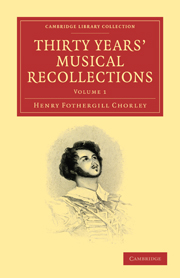THE YEAR 1843
Published online by Cambridge University Press: 29 August 2010
Summary
As regarded music, the Italian season of 1843 was dry and unsatisfactory.—The Opera-houses had come to an absolute dependance on Donizetti for novelties—the star of Signor Verdi not yet having risen on this side of the Alps. His name had reached England by the agency of an English woman—Mrs. Alfred Shaw—who had made her first appearance on the stage, in Italy, in his “Oberto” (I think his first opera), and whose letters home spoke of the maestro as a composer of promise; but, for the hour, there was no one to be heard, excepting Donizetti. He was then near the end of his creations—since, shortly after “Don Pasquale” was produced, his mind gave way (as has been told), and his life of incessant brain and fancy, and bodily indulgence, came to its painful solution in imbecility, and, not long afterwards, in death.
That “Linda” is a work which has not had its fair share of success among Donizetti's works, I feel, so often as the long list of them comes before me. It was written with a careful solidity, not tried for in many of the operas slightly flung off by him. The story, founded on a sentimental French drama, “La Grace de Dieu” (which Madame Albert used to act in London so pathetically), is balanced betwixt what is lachrymose and what is disagreeable, and fails to provide that direct appeal to the sympathies which another sentimental opera story, kindred to it in quality, (that of “La Sonnambula”), furnishes.
- Type
- Chapter
- Information
- Thirty Years' Musical Recollections , pp. 220 - 229Publisher: Cambridge University PressPrint publication year: 2009First published in: 1862



